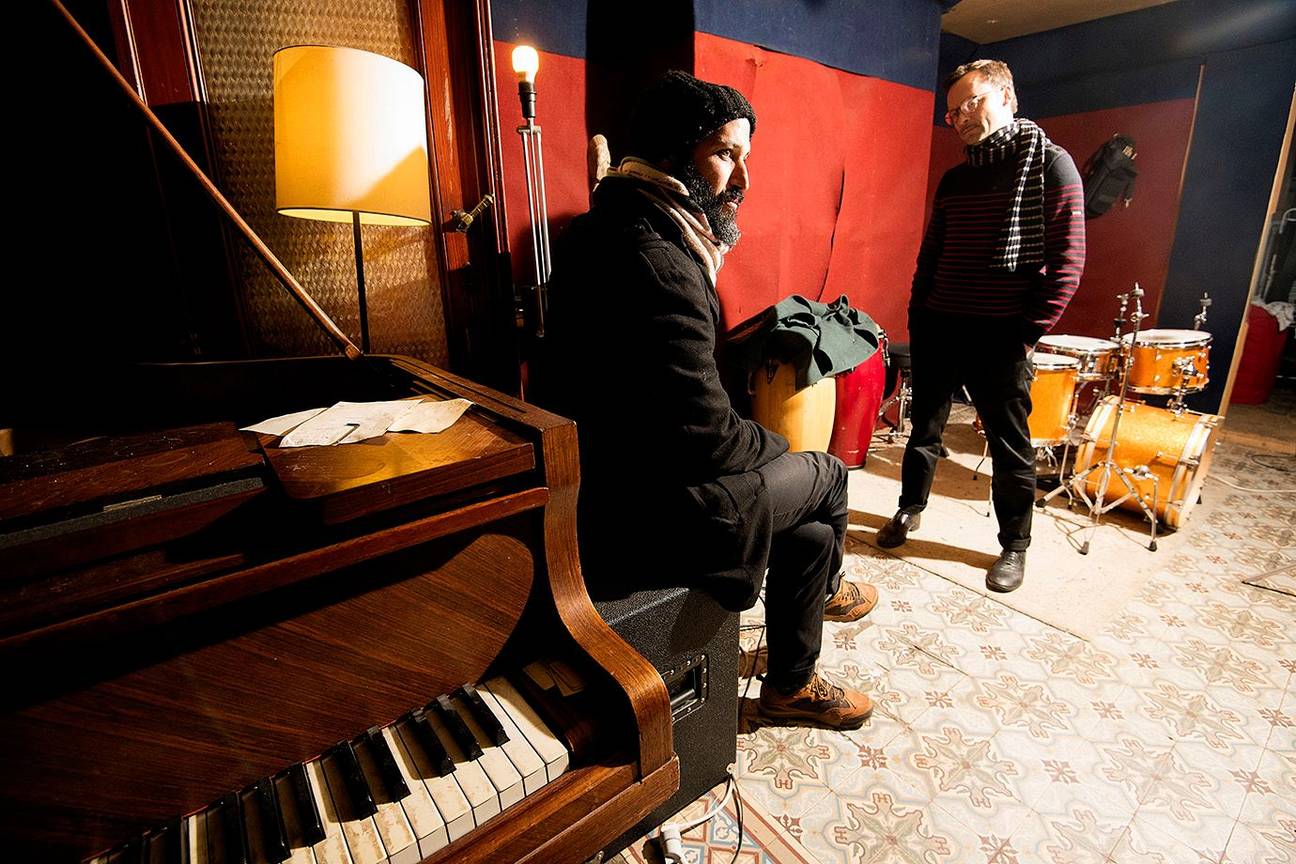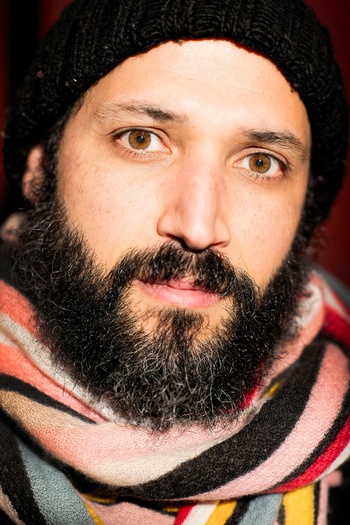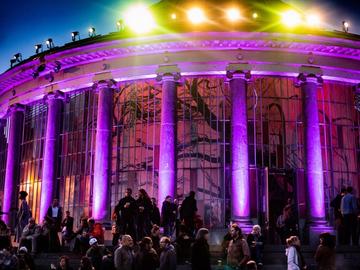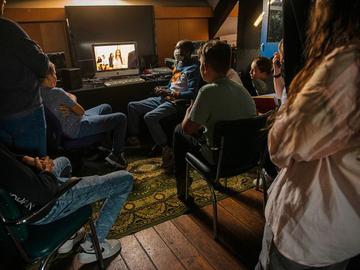Jawhar’s mysterious vocals and muted guitar plucking evoke the spirit of the English singer-songwriter Nick Drake, even though they were inspired by events in his native Tunisia and were conceived in a dark cellar in Sint-Gillis/Saint-Gilles.

© Ivan Put
| Jawhar
The mysterious vocals of Jawhar
It is an unusual symbiosis of Western folk pop and sounds from the Arab world, which is nevertheless deeply compelling. His musicians in Brussels don’t understand a word of Jawhar Basti’s Tunisian, but that doesn’t make it any less poetic. The tones are even warmer now than on Qibla Wa Qobla, the first full album in his mother tongue, which was released five years ago.
The new Winrah Marah will only appear at the end of April, but there will be a preview at the Botanique very soon. Recorded in a studio in Beersel, they were first conceived in a rehearsal basement in Sint-Gillis/Saint-Gilles that has a venerable history in the Brussels scene. “The last musician who really lived here was our keyboard player Eric Bribosia, but many musicians have passed through over the years, including Jozef Dumoulin, Teun Verbruggen, and Bruno Vansina,” says Yannick Dupont, who plays bass in Jawhar’s band and accompanied him to the interview.
The Tunisian troubadour has lived in Belgium for years, but frequently returns to his native land, where he is currently collaborating on a dance production. “I used to sing in English,” he says, referring to his album debut When Rainbows Call, My Rainbows Fly, which was released in 2004.
Pink Floyd
“I started listening to Western music when I was young. Pink Floyd and things like that. But I found folk singers with a guitar especially appealing because they exuded freedom, while the music was easier than oriental music, which is often very technical. But I made the first album too quickly and after a while, I couldn’t really see how it was telling my story. The turning point, the desire to sing again, only came when I was back in Tunisia writing pieces in Tunisian for the theatre production Hobb Story by Lotfi Achour.”
In the play, which was staged just before the Tunisian revolution in 2011, dictator Ben Ali and his wife were depicted onstage as Macbeth and Lady Macbeth. It caused considerable controversy because it depicted love and sex, which are very sensitive subjects in the Arab world and are often hidden away.
“But the censor couldn’t stop it because it was so successful,” Jawhar explains. In that same period, he came into contact with the protest movement that would eventually lead to the Arab Spring and ultimately result in the downfall of Ben Ali. Jawhar had left the country when he was twenty to study English literature and theatre in Lille.
I used to sing in English, but after a while, I couldn't really see how it was telling my story. The desire to sing again only came when I was back in Tunisia.
The post revolution blues
The aftereffects of the revolution filter through in “Menich Hzin”, one the ten tracks on Winrah Marah. “It is about somebody who has spent their whole life hidden in a hole in the ground, and decides to come out one day, but his ‘freedom’ turns out to be a disillusion.” In the song, Jawhar describes the prevailing feeling after the revolution, “because freedom not only has benefits, there are also some very nasty sides to it. Once the solidarity between the people who had revolted against the corrupt system had ebbed away, they were often just left with the blues. Due to the absence of a political order, it soon became every man for himself.”
Jawhar questions many other constrictive social mechanisms too. “Winrah Marah means: ‘Where is Marah gone?’ And Marah is the fictional name of a son invented by a childless woman because she lives in a society that looks down on childless women,” the singer explains his new album’s title. In “Shereb”, he sings about the village idiot.
“As a child, I was fascinated by such colourful, but often also terrifying figures. I later came to understand that for them, it was a way of removing themselves from society in order to survive: if people think you’re crazy, at least they leave you alone.” The most dangerous kinds of people are Islamists, who, as he describes in “Khoussouf”, seek to impose their religion on others.
Taboo
He was not impervious to this himself between the ages of twelve and sixteen. “Young people are more susceptible to movements that promise you heavenly rewards.” He now goes through life as an atheist, which remains a taboo word in Tunisia.
“It is sometimes very funny how hypocritically my religious friends react to a call to prayer if we are having a drink in a bar. But Tunisian politicians are even worse. I know left-wing politicians, even communists, who are atheists but lack the courage to admit it in public forums. ‘Why shock people?’ they ask. ‘We shouldn’t mix politics and religion, religion is in our heart.’ But that is precisely how they play into the Islamists’ hands, when they should actually be saying: ‘I am not religious and I defend the rights of others not to be religious either.’”

© Ivan Put
| Jawhar Basti
Cafichanta
It is not because Jawhar left the land of his birth at a young age in his yearning for freedom and self-expression, that he has forgotten its traditions. On the contrary, they are more palpable than ever on Winrah Marah. “I may not have grown up in a family of professional musicians, but my mother, a professor of Arab literature, and her father did often organize literary musical soirees for friends and family. They were rooted in what Tunisians call ‘cafichanta’.
Derived from the French café chantant, they were very popular in the 1950s and 1960s and combined a very popular style of Tunisian texts and standards. They always appealed to me because in contrast to more serious Arab music, they could be surprisingly critical. In the early years, I often wrote long pieces that would take fifteen or twenty minutes, a little bit like Indian music, but by allowing the texts to become funnier, they also sound more personal.” And he does all this without ever undermining the mystical and impressionist nature of his dream-like songs.
> Jawhar. 27/2, 19u30. Botanique.




Fijn dat je wil reageren. Wie reageert, gaat akkoord met onze huisregels. Hoe reageren via Disqus? Een woordje uitleg.